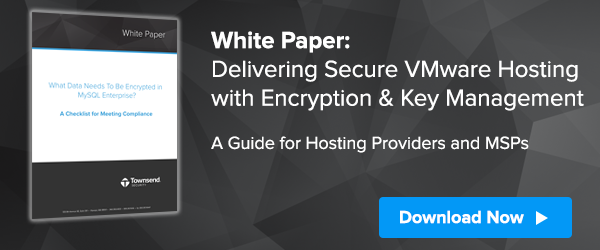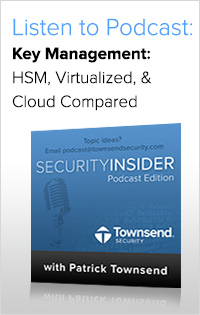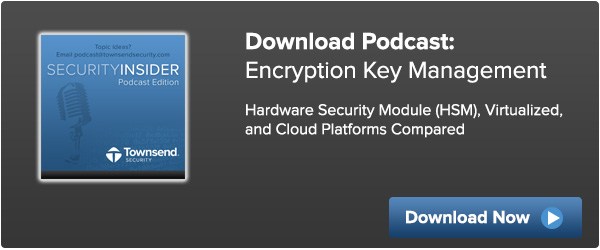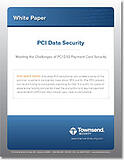This blog is an excerpt from the white paper Delivering Secure VMware Hosting with Encryption & Key Management.
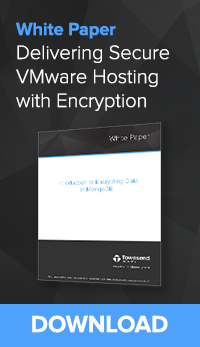 VMware is the most trusted name in on-premise computing infrastructure. Its ease of use and administration, reliability and security provide exceptional services to small and large organizations alike. As organizations move to the cloud, there are now a large number of VMware hosting partners and managed service providers (MSPs) who provide off-premise deployments of VMware and an extensive array of VMware management and administrative services. This white paper discusses how Townsend Security is helping VMware hosting providers meet the challenge of encryption and encryption key management, while supporting the usage-based business model core to many of these hosting providers.
VMware is the most trusted name in on-premise computing infrastructure. Its ease of use and administration, reliability and security provide exceptional services to small and large organizations alike. As organizations move to the cloud, there are now a large number of VMware hosting partners and managed service providers (MSPs) who provide off-premise deployments of VMware and an extensive array of VMware management and administrative services. This white paper discusses how Townsend Security is helping VMware hosting providers meet the challenge of encryption and encryption key management, while supporting the usage-based business model core to many of these hosting providers.
VMware Architecture and Benefits
The benefits of VMware in the data center are now well recognized. Reduction in hardware and utility costs, reduction in administrative costs, improvement in managing ever-changing workloads, resilience and business continuity, and exceptional security are just some of the primary benefits. This is why VMware is the leading infrastructure virtualization technology on a global basis.
In recent years VMware has embraced the movement to the cloud with key partnerships with leading cloud service providers. What is less well known is that VMware has spawned and supports a broad set of hosting providers that serve local and regional markets. These VMware hosting providers also provide the expertise and managed services that many large cloud providers do not.
The growth of the VMware hosting provider eco-system provides important support for VMware customers. Customers now have many options for managing their VMware infrastructure on premise or at a VMware hosting provider data center. Many customers maintain both on-premise and hosted environments to meet their business needs. The VMware eco-system is growing and resilient, and an important part of the IT services landscape.
VMware and Security
While VMware has always been a leader in IT security, the company recognized the importance of encryption and proper encryption key management to meet security best practices and evolving compliance regulations. In 2016 VMware released version 6.5 of vSphere which enabled built-in support for encryption of virtual machines (VMs) and virtual storage (vSAN). In any encryption strategy, it is important to protect the encryption keys using a purpose-built key management security system that secures the keys away from the protected information. The VMware security architecture integrates with a key management server (KMS) to protect the encryption keys that are used by ESXi and vSAN. The interface between vSphere and the key management server is based on the Key Management Interoperability Protocol (KMIP), an open standard for KMS systems.
In vSphere the administrator defines a primary key manager and one or more failover key managers using the KMS Cluster module. vSphere manages the failover to a backup key server in the event the primary key server is not available. This also enables failover to a disaster recovery VMware node in an automatic fashion. The result is a robust implementation of encryption with key management based on the open OASIS KMIP standard and deployed in a highly resilient fashion.
VMware Hosting and MSP Partners
VMware hosting partners and MSPs are called on to deploy proper security in the VMware infrastructure. Security is largely provided by native VMware applications such as NSX and others. However, the deployment of a key management system depends on support from third party KMS vendors. Townsend Security is one of those vendors with its Alliance Key Manager solution.
Unfortunately, most enterprise KMS systems are expensive, difficult to deploy, lack needed failover reliability, and have complex licensing and management requirements. Many VMware hosting providers provide their infrastructure and services on a usage-based model. Enterprise KMS systems generally do not fit this delivery, reporting and billing model.
Townsend Security is solving this problem by providing its Alliance Key Manager solution on a usage basis. VMware hosting providers will benefit from the Townsend model as it matches their business delivery model and makes KMS affordable to their end customers. When your encryption key management strategy lines up with your business model you are able to manage your growth in a predictable way.
Delivering Compelling Hosting and Services
VMware hosting providers and MSPs are rapidly changing the way that VMware customers are managing their IT infrastructure. These VMware partners are filling a services and support gap left by typical, large cloud service providers. Hosted VMware infrastructure, Disaster Recovery as a Service (DRaaS), automated backup and recovery, and expertise on demand provide compelling value to VMware end customers.
Townsend Security’s Alliance Key Manager is filling the KMS gap for VMware hosting providers and MSPs by providing an Enterprise KMS system that matches the way they do business. Gone are the complexities of sourcing, deploying, licensing and administering a KMS for the VMware environment. Townsend Security empowers the VMware hosting provider with on-premise and customer premise solutions for every VMware KMS need.

